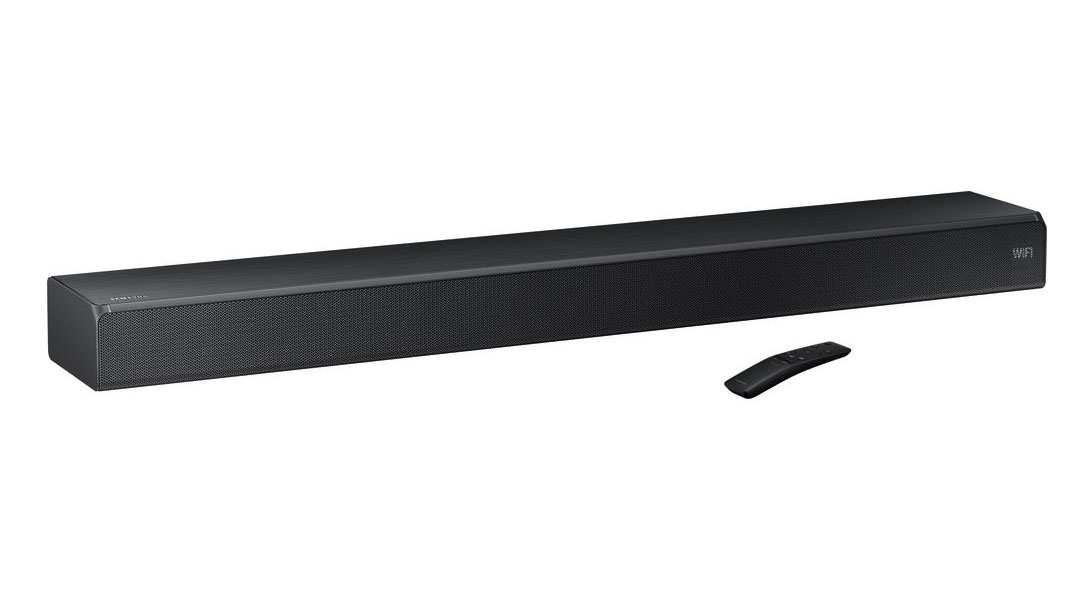TechRadar Verdict
The MS550 produces a startlingly large wall of sound for such a compact, one-body speaker. It also looks the part, and supports a great range of sources. It’s just that once you’ve heard the only £100 more expensive MS650 in action, stepping down to the MS550 could be hard to do.
Pros
- +
Superb build quality
- +
Very large sound stage
- +
Richly detailed sound
- +
Easily readable LED display
Cons
- -
Bass can sound awkward
- -
Dialogue can sound vague
- -
Struggles vs the MS650
- -
No 4K/HDR passthrough
Why you can trust TechRadar
Samsung has been heavily investing in home audio products. It even built a state-of-the-art audio lab in California. From what we can tell so far, that investment seems to be paying off handsomely. Well, that's if the class-leading K950 and MS650 soundbars we’ve seen in recent times are representative of its efforts.
Given Samsung has been building up a pretty fantastic track record, we were excited to get our hands on the MS650’s smaller sibling, the MS550. It may have been on shelves for a little while now, but that means there are sizeable savings to be made. And combine a good deal with Samsung's best-in-class audio tech and you could have the perfect option for replacing the tinny speakers sat inside your tellybox.
Samsung HW-MS550 design
Dimensions: 890(w) x 69(h) x 130(d)mm
Speaker configuration: 2.1
Claimed audio power: 450@;
Connections: Single 4K/HDR HDMI loop through, one optical audio input, 3.5mm audio port, 2-way Bluetooth, wi-fi
Granted the MS550 isn’t as outright glamorous as some of today’s soundbars, but it’s superbly well built, with enough weight and robustness to raise hopes it will pack almost as powerful a punch as the MS650 without succumbing to unwanted vibrations, rattles or dropouts.
The brushed metallic finish on the top edge looks stylish but serious too, while the grille on the front edge looks crisp and no-nonsense. It’s great at this price point, too, to discover an LED display under the right hand side of this grille that tells you which input you’ve got selected.
The projector’s bottom edge carries screw points for fixing the MS550 to the wall if you wish, using a ‘One Mount’ system you can pick up for around £70 at the time of writing.
There’s also a recessed section on the bottom edge containing the soundbar’s connections. These include a handy power loop through so you can power a Samsung TV through the soundbar; an optical digital audio input; a 3.5mm auxiliary input; an HDMI loopthrough; and a powered USB port you can use for either recharging your portable gear or playing media files from USB sticks.
There’s no second HDMI input like you get on the K850 and K950 Dolby Atmos models. However, since the MS550 doesn’t support Atmos you could easily connect your TV to the soundbar using its HDMI’s audio return channel (ARC) capabilities, so that your TV effectively becomes the soundbar’s switching box.
Sign up for breaking news, reviews, opinion, top tech deals, and more.
The MS550 is smaller than the MS650: 890mm versus 1060mm wide, and 69mm versus 76mm high. This height difference makes the MS550 significantly more likely to fit under the frame of a typical TV when sat on the same piece of furniture.
Design TL;DR: The MS550 is beautifully built and looks like it should cost much more than the £299 it's on sale for in most places. It’s impressively compact, too, considering how much power it’s got...

Samsung HW-MS550 features
Being that much smaller than the MS650 does mean there’s less space for speakers in the MS550. It only gets six drivers versus the MS650’s nine: four main drivers, and two wide-dispersion tweeters.
It’s specifically designed to offer a tidy one-box solution, though you can if you wish add Samsung’s SWA-9000S wireless rear speaker package for a true surround sound experience. Bizarrely, at the time of writing one or two stores online seem to be offering a MS550 plus 9000S package for the same price as the MS550 alone!
While it might not have as many built in drivers as the MS650, the MS550 does retain the same proprietary Samsung distortion cancelling technology. This should allow it to deliver levels of bass and volume that such a compact unit normally couldn’t achieve without the sound becoming fuzzy, compressed, harsh or unbalanced.
The MS550’s connectivity initially looks exemplary, with both Wi-Fi and Bluetooth streaming available alongside the ‘hard’ connections mentioned earlier. Thanks to these wireless options, the MS550 can play stuff stored on networked or Bluetooth devices; can be integrated into a wider Samsung multi-room speaker set up; and can be controlled/set up via Samsung’s MultiRoom app for iOS and Android.
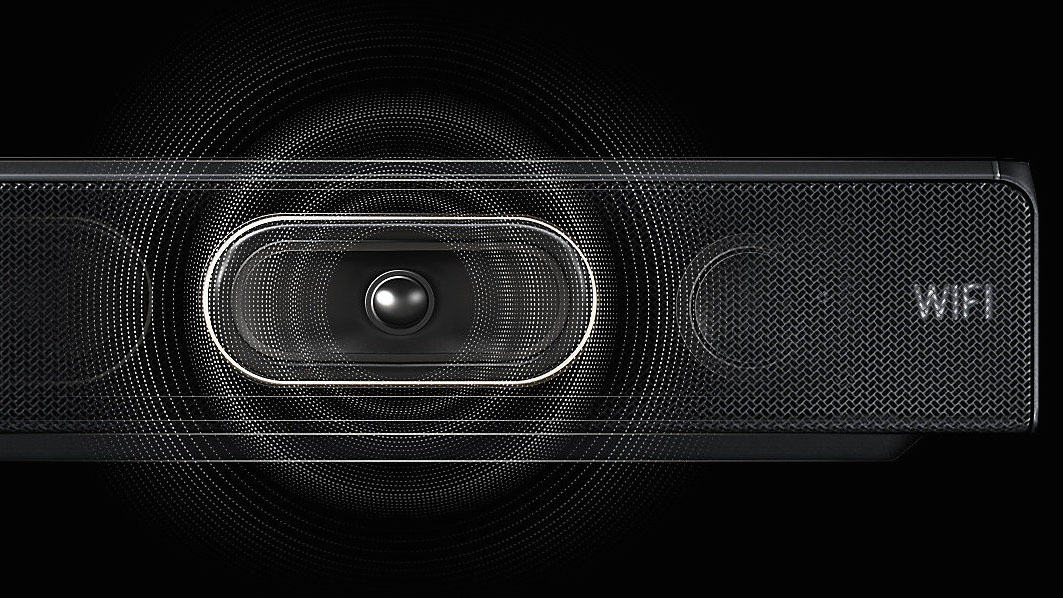
It turns out, though, that the MS550 suffers one significant connection shortcoming versus the MS650: no support for 4K and HDR on the HDMI passthrough. This means that you can’t pass video through from a 4K Blu-ray player without losing the latest video disc format’s key resolution and light range advantages.
This isn’t the end of the world. You could always connect a 4K Blu-ray player’s HDMI output direct to the TV for 4K HDR, and then connect its optical digital audio output - or its dedicated audio HDMI if it has one - to the soundbar. It’s something else worth worth considering, though, if you’re trying to decide between the MS550 and step-up MS650. As is the fact that the MS550’s speakers work in a 2.0-channel configuration versus the 3.0-channel set up of the MS650.
Getting back to the good stuff, aside from the buttons you have to press to add speakers or get the speaker onto your Wi-Fi system being unhelpfully placed on the speaker’s underside, the MS550 is admirably easy to use and set up. Especially with that little LED display on hand to always help you know where you are.
It also supports a good range of multimedia files, including the ALAC and FLAC high resolution audio formats, played at 24-bit, 96kHz.
Its frequency response, finally, is claimed to be a respectable 50Hz to 20kHz - though here again it loses out - potentially significantly - to the MS650’s 40Hz-20kHz.
Features TL;DR: Aside from not supporting 4K HDR passthrough, the MS550 is pretty much exemplary with its connectivity and source support. It’s easy to use, too. While its speaker specifications look good versus many rivals, though, they do fall substantially short of those of the step-up MS650.
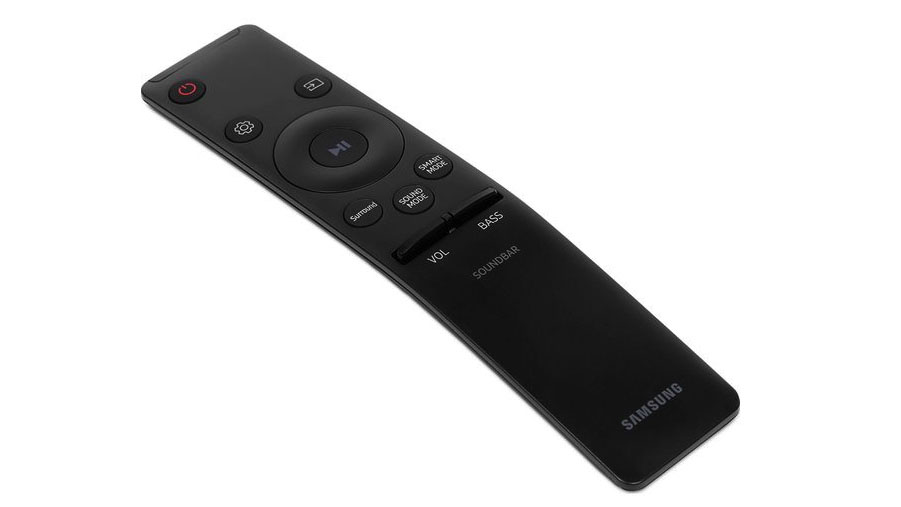
Samsung HW-MS550 performance
If you haven’t been lucky enough to hear the phenomenal MS650 in action, you might well think the MS550 sounds pretty good.
It achieves plenty of ‘throw’ from those six drivers, for starters, creating a sound presence far larger than you’d expect from such a compact unit. Impressively there even seems to be a strong sense of height as well as width to the sound stage, despite the MS550 not sporting any up-firing drivers. The speakers are sensitive enough to pick out even small details in the sound mix, and there’s a strong sense of left and right separation that works well with music as well as movies.
The mid-range sounds open and clear, which helps it deliver a fairly satisfying sense of swelling and expansion when required by an action scene.
It also joins Samsung’s other recent sound bars in hitting deeper bass frequencies than the majority of other soundbars in the same price bracket.
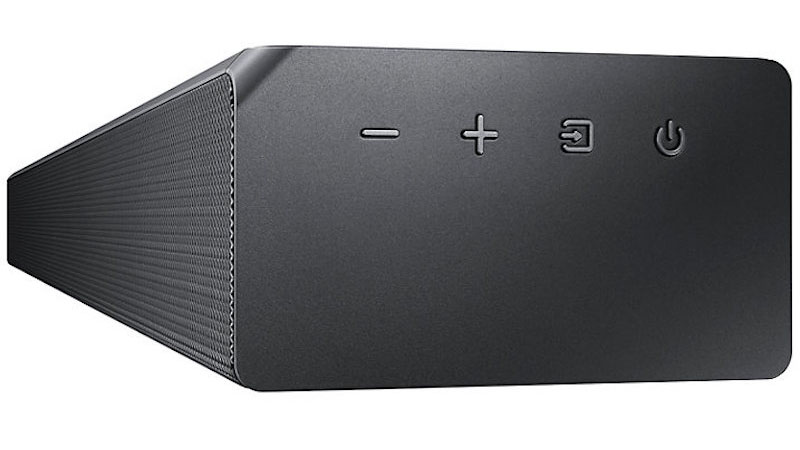
The issues with the MS550 come when you consider how far it falls short of the MS650. For instance, while dialogue is presented with a reasonably rounded tone, it feels a little vaguely positioned in the mix at times versus the stunning precision delivered by the MS650’s dedicated centre channel.
Next, while bass isn’t bad by general soundbar standards, the MS550 can’t go nearly as deep as the MS650. Worse, the bass doesn’t integrate as cleanly and effectively into the rest of the soundstage as it does with the MS650. With movies it tends to sound a little forced and muffled versus the other sound elements. This draws undue attention to itself and even, occasionally, starts to sound a touch distorted, despite the best efforts of Samsung’s distortion-cancelling technology.
The difference in bass prowess is as apparent with music as movies, with the lowest song basslines tending to sound like they’re cramping the mid-range’s style rather than correctly slotting in below the mid-range’s bottom end like they do on the MS650.
Performance TL;DR: The MS550 produces a wide soundstage and delivers plenty of detail and a reasonably open mid-range. It falls way short of the MS650 with dialogue and bass handling, though.
Value
While the MS550 certainly isn’t bad value at £299 (which is the highest price we've spotted it from most online retailers), in truth the main thing we took away from it was an even bigger sense of just what great value the MS650 model is. The step-up in performance that model delivers is worth way more than a mere £100 difference.
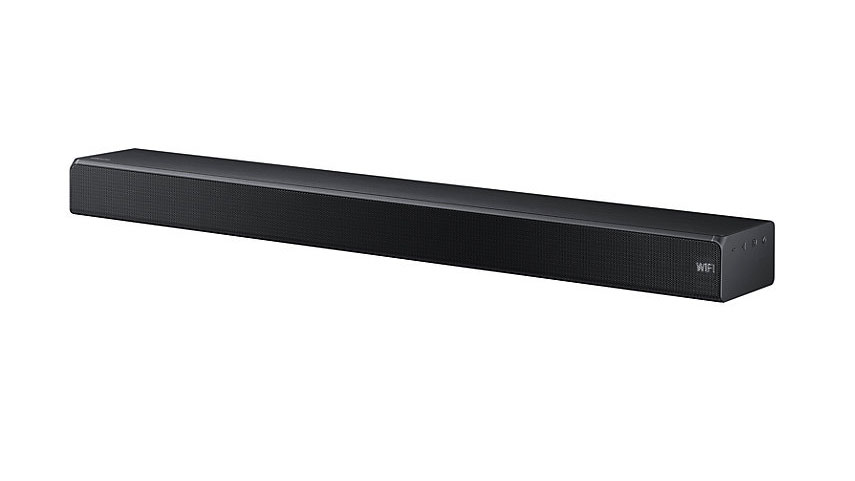
Other soundbars to consider
The main competition for the MS550 is Samsung’s own MS650, which delivers a whole other stratosphere of sound quality for only £50 more in most online retailers.
Samsung HW-MS550: final review verdict
The MS550 is in itself a decent enough soundbar for £299. It supports an impressive range of audio sources, and is beautifully put together for its money. It also produces a large sound stage for a sub-£400 single-body soundbar - and aside from some occasional bass muffles, it controls that sound stage surprisingly well.
The problem for the MS550 is how far short it falls of its own MS650 sibling. The extent to which the MS650 steps up its game over and above the MS550 is, for us at least, worth way more than the tiny difference in price. So if you can afford to make the leap up, we strongly recommend that you do so.
- Our list of the best soundbars has all our top recommendations

John has been writing about home entertainment technology for more than two decades - an especially impressive feat considering he still claims to only be 35 years old (yeah, right). In that time he’s reviewed hundreds if not thousands of TVs, projectors and speakers, and spent frankly far too long sitting by himself in a dark room.
